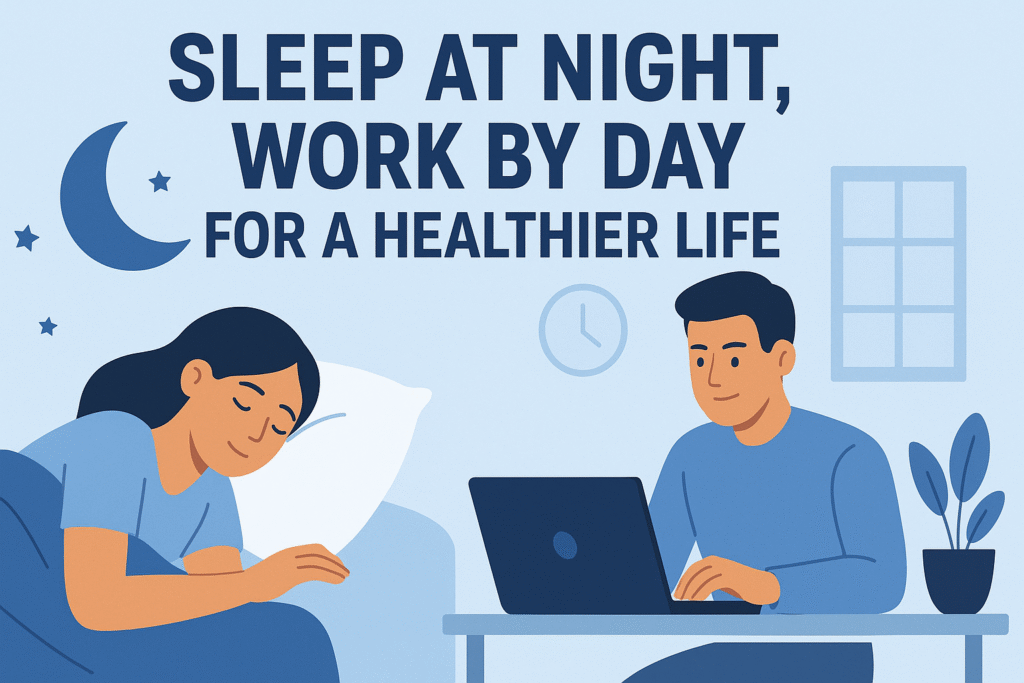
Sleep at Night, Work by Day for a Healthier Life
Introduction
In today’s fast-paced world, many of us have difficulty finding a healthy balance between rest and productivity. Yet something as fundamental as sleeping at night and working by day may be the starting point for a healthier life. Aligning our daily routines with our natural biological rhythms—known as circadian rhythms—offers powerful benefits for both mind and body.
- Understanding Circadian Rhythms & Why They Matter
What Are Circadian Rhythms?
These are 24-hour internal clocks that guide various physiological processes—including sleep, metabolism, hormone release, mood, and immune function—by syncing with environmental light-dark cycles. Sleep Foundation. Sleeping at night and being active by day aligns you with this innate rhythm, offering essential benefits.
Why Daylight and Darkness Matter
Melatonin is suppressed by natural light in the morning to tell your body to get up, while darkness increases melatonin to promote deeper sleep. Sleep Foundation. PubMed Central.
- Major Benefits of Aligning with Natural Sleep–Wake Cycles
Superior Sleep Quality
Sleeping and waking up regularly every night enhances the depth and duration of sleep. Verywell Mind. NHLBI, NIH.
Enhanced Mental Clarity & Mood Stability
Better alignment supports cognitive function, emotional balance, and improved mood. Verywell Mind. SleepHealth.org. Sleep.com.
Stronger Immunity & Lower Inflammation
Quality sleep regulates inflammatory cytokines and boosts immune response. PubMed Central.
Improved Metabolism & Weight Management
Adequate sleep supports hormonal balance—reducing caloric intake and aiding cardiometabolic health. PubMed Central. SleepHealth.org. Wikipedia.
Heart and Metabolic Protection
The right sleep pattern also significantly reduces the risk of high blood pressure, diabetes, obesity, and abdominal fat. www.heart.org.
Successful Aging
One study found that sleeping 7–8 hours nightly boosts healthy aging—defined as freedom from major disease and preserved physical/cognitive function—by 18%. Verywell Health.
- The Risks of Disruption: Why Sleeping at Night Matters
Shift Work & Circadian Misalignment
When your routine opposes your natural clock—like working nights—you’re more vulnerable to metabolic disruption, cardiovascular issues, immune impairment, mood disorders, and even cancer risk. PubMed Central.
Chronic Biological Disruption & Health Effects
Studies show that chronic misalignment is associated with higher insulin resistance, obesity, inflammation, and metabolic disorders. Wikipedia.
Cognitive Decline Over Time
Long-term misaligned sleep contributes to impaired cognitive performance and increased dementia risk—especially in older individuals. Wikipedia.
- Practical Steps to Sleep at Night and Work by Day
Stick to a Consistent Schedule
Either get up and go to bed at the same time every day (even weekends). Verywell Mind. NHLBI, NIH.
Boost Morning Light Exposure
Incorporate 20–30 minutes outside in the morning to help you stay awake. Vogue. The Sentinel. PubMed Central.
Wind Down with Evening Rituals
Avoid screens before bed; dim lights and adopt relaxing pre-sleep routines. NHLBI, NIH. Vogue.
Optimize Sleep Environment
Your bedroom should be cool, quiet, and dark to induce restorative sleep. The Sentinel.
Time Your Meals and Stay Active
Regular meal times and daytime exercise support circadian synchronization—and avoid heavy meals close to bedtime. Vogue. Wikipedia.
Smart Use of “Sleep Banking” for Special Circumstances
If you anticipate disrupted sleep, recovering extra hours beforehand (sleep banking) boosts alertness and performance. The Washington Post.
- Scientific Evidence: What Research Tells Us
Multidimensional Sleep and Heart Health
A 2021 study of 4,559 U.S. adults found ideal sleep health was linked to up to 73% lower risk of obesity and 66% lower risk of high blood pressure. www.heart.org.Immune & Inflammatory Balance
Proper sleep balances type-1 and type-2 cytokines, bolstering immunity and lowering inflammation. PubMed Central.Metabolism & Weight Control
Sleep duration enhanced intake of calories in habitual short sleepers and improved cardiometabolic profile. PubMed Central.Sleep & Healthy Aging
A person who got 7–8 hours of sleep consistently was 18% more likely to age healthily. Verywell Health.Circadian Light & Mental Health
Pharmacies using electrochromic glass to boost daytime light saw earlier sleep onset and better mood. PubMed Central.Sleep Banking Mitigates Sleep Loss
Individuals who preemptively extended sleep retained better alertness and recovered faster during sleep deprivation. The Washington Post.Conclusion
Sleeping at night and working by day is more than just a tradition—it’s a health imperative. By honoring your body’s natural rhythms, you can unlock:
- Deeper, more restorative sleep
- Sharper mental performance and better mood
- Stronger immunity and long-term wellness
- Improved heart, metabolic, and aging outcomes
Implementing consistent sleep routines, planning effective exposure to light, and mindful daily behavior helps your body and mind function. For lasting health, prioritize your sleep—it’s as vital as diet, exercise, and mindset.
